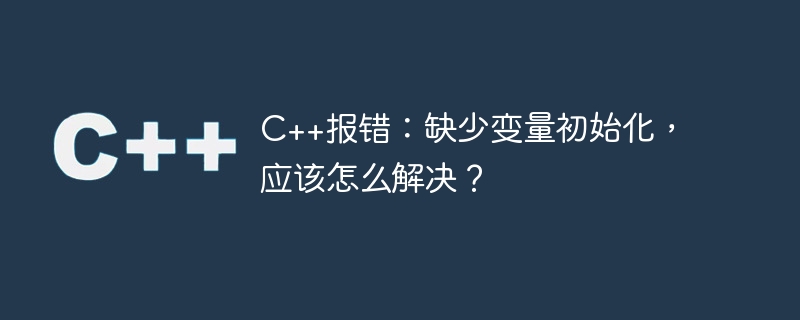Home >Backend Development >C++ >C++ error: Missing variable initialization, how to solve it?
C++ error: Missing variable initialization, how to solve it?
- WBOYWBOYWBOYWBOYWBOYWBOYWBOYWBOYWBOYWBOYWBOYWBOYWBOriginal
- 2023-08-22 14:30:342340browse

If you encounter an error about missing variable initialization when writing code in C, it is very important to solve this error. This article will discuss how to solve this problem.
First of all, you need to understand what variable initialization means. In C programming, variable initialization refers to the process of assigning a value to a variable when it is declared. For example, this is an example of variable initialization:
int a = 5;
In this example, variable a is initialized to 5. However, if a variable is not initialized when it is declared, it needs to be initialized before it can be used. If this is not done, the compiler will report an error.
Next, let’s take a look at how to solve the missing variable initialization error in C. Here are several common solutions:
- Initialize the variable when it is declared
This is the simplest solution. When you declare a variable, make sure to initialize it. For example:
int a = 0;
This will assign the variable a an initial value of 0 so that it can be used in subsequent code.
- Initialization in the constructor
If you use variables in a class, you can use the constructor to assign an initial value to the variable. For example:
class MyClass{
public:
MyClass(){ //构造函数
a = 0;
}
private:
int a;
};In this example, we initialize the variable a to 0 in the constructor of MyClass.
- Use default constructor
If your class does not have any constructor, the compiler will generate a default constructor for you. The default constructor initializes all variables to their default values. For example, the default value of an int variable is 0, and the default value of a bool variable is false. If your variable value can be initialized by the default constructor, you can use it.
- Using an initialization list
If you define a constructor in a class, you can use an initialization list to initialize variables. For example:
class MyClass{
public:
MyClass(int a):a(a){ //使用初始化列表
}
private:
int a;
};In this example, we use the initialization list to initialize variable a.
- Using static variables
If you use a variable in a function, you can use a static variable to initialize it. Static variables are initialized only once and remain throughout the entire program. For example:
void myFunction(){
static int a = 0;
}In this example, we use the static variable a in the myFunction function and initialize it to 0.
In short, missing variable initialization is a common mistake in C. When solving this problem, make sure you initialize the variable when it is declared or use some other method to initialize it. This will ensure that the program runs properly and avoid possible errors.
The above is the detailed content of C++ error: Missing variable initialization, how to solve it?. For more information, please follow other related articles on the PHP Chinese website!

